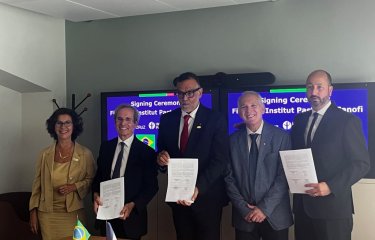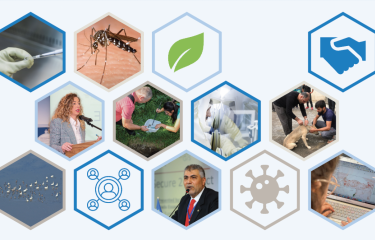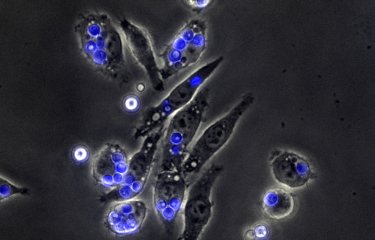Countering the bacteria responsible for leptospirosis by attacking the "shield" they make to protect themselves: this is the strategy that Roman Thibeaux, a young researcher at the Institut Pasteur de Nouvelle-Calédonie is trying to develop. Born on the island, he left the South Pacific region for a decade before coming back better armed.
Roman Thibeaux has been immersed in a medical environment since he was a little child – his father is a nurse, his mother a medical secretary. Born in Nouméa in 1985, he was very early confronted to infectious diseases: "When I was little, I heard about people who had leprosy or leptospirosis, there were epidemics of dengue fever every year. It impressed me. I was afraid of these diseases and at the same time I thought we had to fight! " says the thirty years-old’s.

When Roman obtains his degree in Life Sciences at the University of New Caledonia, he had no choice but to leave the island to continue his studies. He then thought pursuing in marine biology, influenced by his teachers, many of whom worked on fish and the management of marine stocks. The student then sent an application in Brest in marine biology and one in Paris in genetics. "My file for the University of Brest has been lost!" says the one who lived then more than 16,000 kilometers away from the metropolitan France. Fate brings him to the University Denis Diderot in Paris for a European M.S degree of Genetics, focused on pathogens. For his internship, Roman worked 6 months on parasites at Albert Einstein College of Medicine in New York. "This was my first real research experience on infectious diseases. I really thrived and decided to continue in this path."
At the Institut Pasteur I was immersed in a very stimulating world of research excellence
In 2009, he embarked on a doctorate on intestinal amebiasis - a pathology caused by the amoeba Entamoeba histolytica - in the Cell Biology of Parasitism Unit at the Institut Pasteur in Paris. After his PhD, he continued in the same laboratory for 2 years as a post doc: "At the Institut Pasteur I was immersed in a very stimulating world of scientific research excellence.We identified a virulence factor that the parasite expresses to penetrate the human intestinal mucosa." Roman Thibeaux stays one more year away from his native island for a new post doc, at the Ecole Centrale in Paris. "I was a bit of an alien in a lab of mechanical researchers. They needed my skills to develop a bioreactor cell culture systems of bone tissue" Roman laughs. At the same time, he developed new skills in X-ray imaging. "It's fascinating to visualize the interactions between human cells and the pathogen," he explains. "I'm trying to implement this at the Institut Pasteur de Nouvelle Calédonie, even though we do not have all the necessary equipment yet."
To fight the biofilm, the armor of bacteria
Since early 2016, Roman Thibeaux returned to New Caledonia with his wife met in Paris. Funded by the AXA Foundation for Research, he is studying environmental leptospirosis, a bacterial disease transmitted to humans via contaminated water. "Leptospires are able to cluster within an extracellular matrix called biofilm. We are focusing our research on this structure "explains the scientist.

His studies have shown that this biofilm protects the bacteria from environmental stresses allowing them to survive and to ultimately contaminate a mammal reservoir and possibly humans. In New Caledonia, most infections occur when swimming in water contaminated with urine from infected animals (rodents, wild pigs, deer ...). The Institut Pasteur de Nouvelle-Calédonie team carried out soil sampling at sites where patients thought they had been infected. "Our samples contained several new species of leptospires, twelve in total, an unexpected discovery" says the researcher. The lamella deposition on these sites has also allowed them to highlight the formation of a biofilm hosting leptospires. "If we can analyze its composition or understand how it is secreted, we could develop tools to prevent its production or degrade it and make bacteria vulnerable". Another path: leptospires proliferate in the kidneys of animals before being excreted in the environment. "We believe that the biofilm could protect bacteria against the acidity of the urine during renal carriage. If this is the case an intervention limiting the production of biofilm, would decrease the chronic carriage in mammals. Let’s go for several years of work " Roman says enthousiastically.
In 2016, Roman Thibeaux was recruited by the government of New Caledonia and positionned at the Institut Pasteur de Nouvelle-Calédonie. An ideal career path for him who reluctantly left the Pacific: "It is a great satisfaction to help advance science on a disease that particularly affects the Caledonians."
Roman Thibeaux, scientist at the Institut Pasteur de Nouvelle-Calédonie

- 1985: Born in Nouméa
- 2006: Bachelor of Sciences and Technologies, specialized in Life sciences (University of Nouvelle-Calédonie)
- 2008: European Master degree in Genetics (University Denis Diderot, Paris VII)
- 2009-2011: PhD at Institut Pasteur in Paris, Cell Biology of Parasitism Unit
- 2012-2014: Post-doc at Institut Pasteur in Paris, Cell Biology of Parasitism Unit
- 2015: Post-doc at Ecole Central de Paris, Mechanics of Soils, Structures and Materials laboratory
- Since 2016: Researcher at Institut Pasteur de Nouvelle-Calédonie, Unit of Research and Expertise on Leptospirosis





